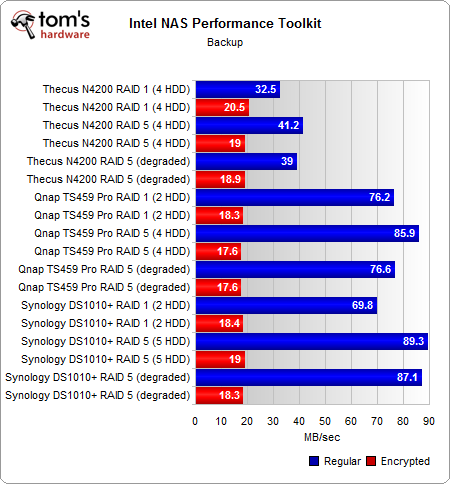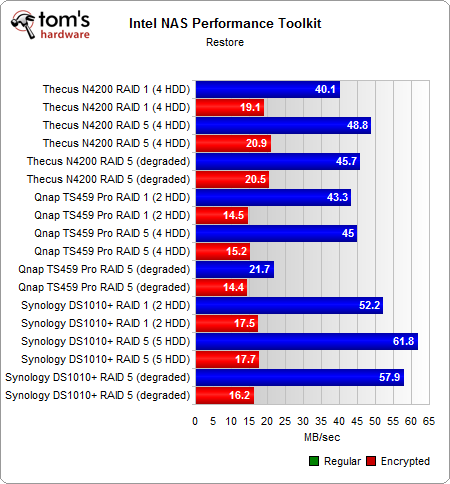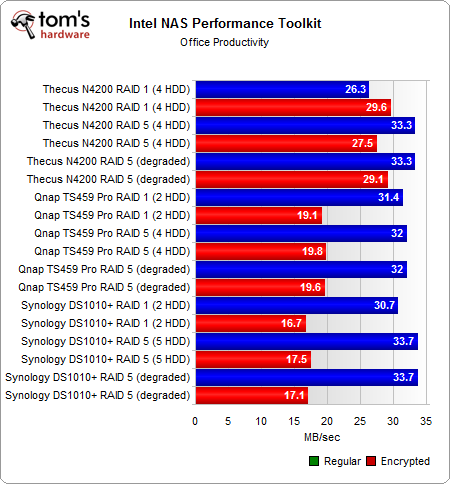Is Data Encryption Worth Destroying Your NAS' Performance?
Three vendors of network-attached storage, Qnap, Synology, and Thecus, sent over Intel Atom-based NAS servers to test the effects of protecting your data via encryption. But performance and configuration options are not identical, as our testing shows.
Benchmark Results: Office
More Benchmark Results Can Be Found In the Picture Gallery.
The test results from the backup tests are just as disappointing as those from the “HD Video Record” benchmark. Performance losses of up to 80% just cannot be ignored. Again, it is striking how similar the performance is between the NAS devices when encryption is enabled.
The situation is similar in the other tests, though the Thecus N4200 is a little bit faster than its competitors. Only the 29.6 MB/s in the “Office Productivity” test in RAID 1 with encryption activated stands out a bit, and we do not know why. We considered blaming the test setup, but after closely reviewing the test settings and the equipment, as well as running the tests several times, we decided to exclude that.
Get Tom's Hardware's best news and in-depth reviews, straight to your inbox.
Current page: Benchmark Results: Office
Prev Page Benchmark Results: Multimedia Next Page Conclusion-
und3rsc0re You guys should do this test using a few solid state drives, im interested to know the results if encryption affects the performance of them much.Reply -
compton What about a Core i5 or better based server? You could turn an i5 with aes-ni into a cheap server for the same price as these diskless enclosures. Couldn't it be turned into a Linux based NAS with hardware encryption? I'm not hip to all of the issues, but that was my first thought.Reply -
rhangman What about a VIA based solution? Low power like an Atom, cheap and has the padlock hardware encryption engine.Reply
http://www.via.com.tw/en/initiatives/padlock/hardware.jsp -
maybe you could test the other nas´tooReply
http://www.tomshardware.com/charts/multi-bay-nas-charts-2011/benchmarks,121.html
already has a performance overview so just add encryption test -
huron I like what you guys are doing here at Toms...very interesting article. Any chance you guys can get your hands on a better processor to see what the results would be - I know how resource heavy encryption/decryption can be, and worry these don't really have enough horsepower to handle the job well.Reply
Continue this as a series with better CPUs? -
bwcbwc The implication for all of these devices is that the data is encrypted/decrypted within the device, which in turn means that the data is transmitted over the network in unencrypted form.Reply
The risk of a packet sniffer on the LAN seems a lot higher than someone walking out the door with your NAS array (or a piece of it), so I think you need to weigh your priorities when you choose this type of solution. If you are ready to address the physical security of data on a network attached drive, you should already have taken steps to ensure the security of the data during transmission. -
freggo What if one where to use TrueCrypt partitions on these servers instead ?Reply
I tested it extensively first and use it now for 2 years on my regular drives, hardly a 'noticable' performance hit compared to the unencrypted drives in the PC and 'zero' errors or problems so far.
-
Prey In a commercial environment, especially medical, hell yes! Go to the HITECH Act and see the breach list over 500 due to unencrypted files that are stolen or lost.Reply
It shouldn't be a performance issue, but more a, is it worth the risk issue. -
Niva Definitely a good article, I'd been thinking about buying the Thecus. Tests with TrueCrypt would be appreciated since that's my tool of choice.Reply



